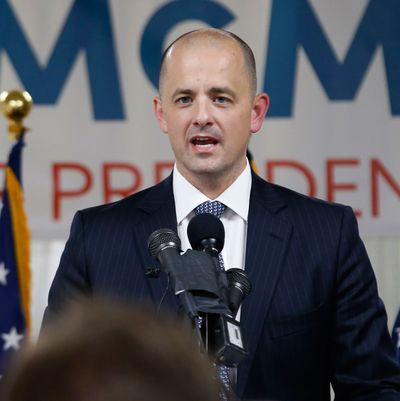
It’s nice to take a break now and then from the victory strategies of the two major-party candidates, and the back-and-forth over which is more realistic, and focus on a real feat of imagination: independent conservative candidate Evan McMullin’s exotic path to the White House.
ABC News pondered this subject for some time, and concluded McMullin’s miracle plan is to win Utah and then deny both Hillary Clinton and Donald Trump the 270 electoral votes necessary to win in the Electoral College, and then prevail in the House as regular Republicans and presumably some Democrats lift the third-place EV winner to the top of the heap.
If that’s a little too weird to absorb all at once, the starting premise is that McMullin will have a shot in a five-candidate race in Utah because (a) many Republicans in that state are allergic to Trump, to Clinton, to libertarianism, and to the lefty Greens; (b) McMullin is a regular Republican conservative; and (c) McMullin is a member of the LDS church. There have been no polls taken in Utah testing McMullin just yet, but Trump is famously not very popular in a state that normally goes Republican about two-to-one or better.
So suspend disbelief (imagine, say, that Mitt Romney chooses to run around Utah with McMullin riding on his shoulders) and give McMullin Utah’s six electorate votes. Unless the Libertarian Moment arrives in some other state in a very big way, that leaves 532 EVs to be divided between Trump and Clinton without either reaching 270. If you go to one of those interactive electoral-college-calculator sites, you can come up with a reasonably plausible scenario where Clinton wins Pennsylvania, Virginia, and Colorado and winds up with 269 EVs, and Trump wins Iowa, Ohio, Florida, New Hampshire, and North Carolina and gets 263. That would indeed throw the race into the House, and at that point we are supposed to believe that a U.S. House repelled by the two major-party candidates will turn to McMullin after 30 or 40 ballots or so.
Is this a clinically insane scenario? Not really, since something vaguely like this (if you want to compare Evan McMullin to John Quincy Adams, which is a tad unfair to the sixth president, who was also secretary of State and Speaker of the U.S. House) happened in 1824. It is absolutely ludicrous, of course, and depends, for even threshold credibility, on the possibility that both Clinton and Trump will do something completely disqualifying between Election Day and a theoretical election in the House, after doing something systematically alienating the people of Utah much earlier. Trump’s made a good start on this last precondition for a McMullin win, but a few dozen other dominoes need to fall before this last gasp of the NeverTrump faction of the Republican Party breathes regularly.






























